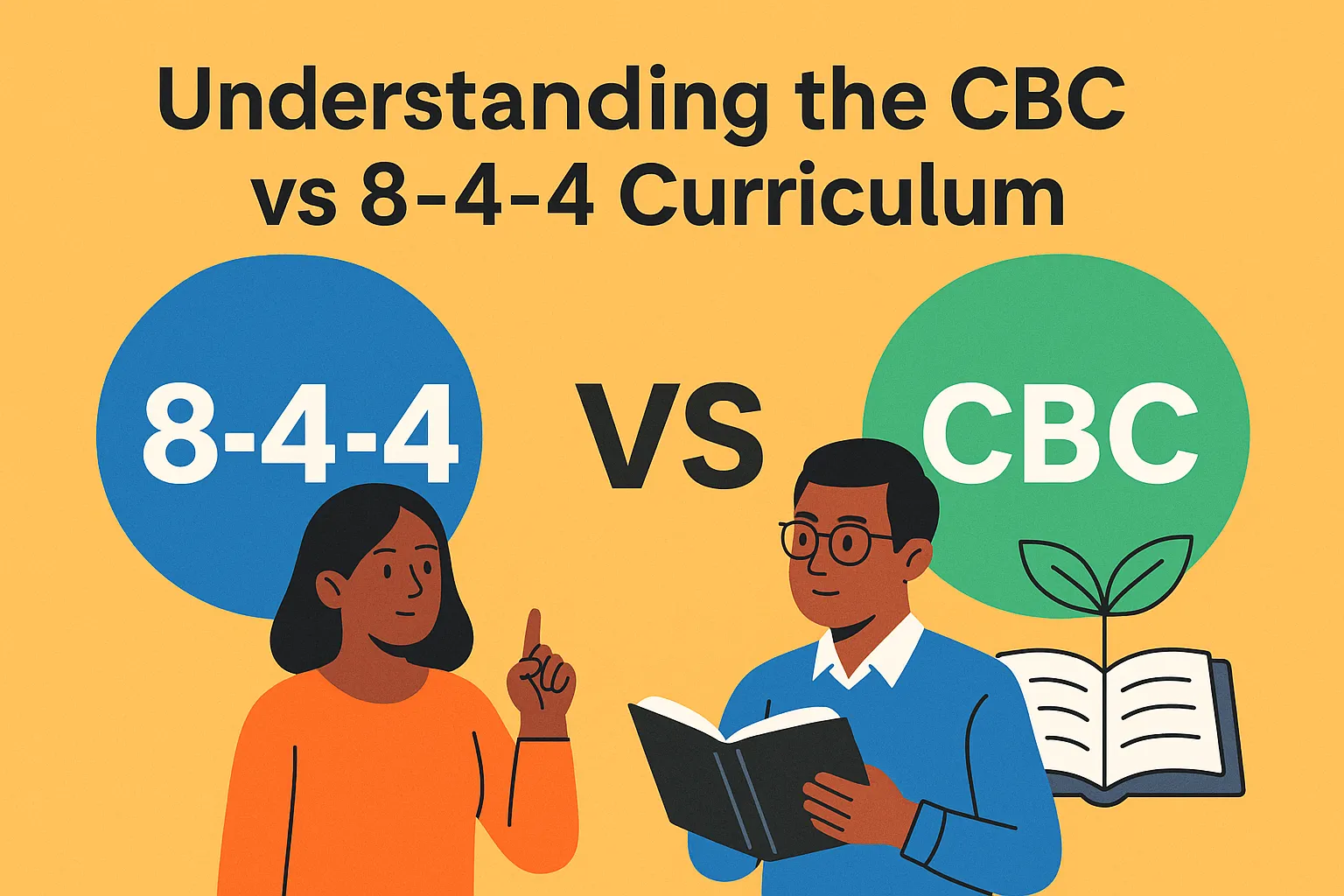🎓 Understanding the CBC vs 8-4-4 Curriculum: What Every Parent & Teacher Should Know
📌 Introduction
Kenya's education landscape has undergone significant transformations over the past few decades. The shift from the 8-4-4 system to the Competency-Based Curriculum (CBC) marks a pivotal moment in the nation's commitment to delivering quality, future-ready education.
This guide dives deep into both systems—exploring:
- ✅ Structure & design
- ✅ Teaching & learning approach
- ✅ Strengths, weaknesses & assessments
- ✅ Implications for learners, parents & teachers
🧭 Overview of the 8-4-4 System
📚 Historical Background
Launched in 1985, 8-4-4 was created to offer 8 years of primary, 4 of secondary, and 4 of university education, equipping learners with practical skills for self-reliance and national development.
🏗️ Structure
- Primary Education: 8 years (Standard 1–8)
- Secondary Education: 4 years (Form 1–4)
- University: 4 years
🎯 Objectives
- Prioritized academic performance
- Prepared learners for KCPE & KCSE
- Focused on theoretical knowledge, not practical application
📝 Assessment
- Summative: KCPE (Std 8) & KCSE (Form 4)
- Continuous: Minimal, with little weight in final grading
🌱 Introduction to the Competency-Based Curriculum (CBC)
🧩 Genesis of CBC
Unveiled in 2017, CBC was designed to solve 8-4-4’s gaps. Its goal? Nurture skills, values, and lifelong learning habits for a fast-changing world.
🏗️ Structure
- Pre-Primary: 2 years (PP1–PP2)
- Lower Primary: 3 years (Grades 1–3)
- Upper Primary: 3 years (Grades 4–6)
- Junior Secondary: 3 years (Grades 7–9)
- Senior Secondary: 3 years (Grades 10–12)
🎯 Objectives
- Build 21st-century competencies like critical thinking & creativity
- Foster values like integrity, responsibility & patriotism
- Shift to learner-centered, experience-based education
📝 Assessment
- Formative: Ongoing tasks, projects, and portfolios
- Summative: At key stages (e.g. Grade 6, 9) but focus is not just recall—it's competence
🔍 Comparative Analysis: 8-4-4 vs CBC
| Aspect | 8-4-4 System | CBC |
|---|---|---|
| Philosophy | Exam-focused | Skill-based, holistic |
| Curriculum Design | Subject-heavy | Competency-centered |
| Teaching Approach | Teacher-led | Learner-driven |
| Assessment | KCPE & KCSE (summative) | Formative + summative |
| Parental Role | Minimal | High involvement |
| Flexibility | Rigid structure | Customizable pathways |
| Skill Development | Limited | Real-world, soft + hard skills emphasized |
🧠 Core Competencies in CBC
The CBC curriculum is built around 7 core competencies:
- Communication & Collaboration – Working and expressing ideas with others
- Critical Thinking & Problem Solving – Making sound decisions
- Creativity & Imagination – Thinking outside the box
- Citizenship – National pride and civic engagement
- Digital Literacy – Navigating tech confidently
- Learning to Learn – Self-motivation & curiosity
- Self-Efficacy – Confidence and resilience
🏫 Implementation Challenges
🔴 8-4-4 System
- Overemphasized exams = high pressure
- Ignored talents, passions
- Poor skill development
🟠 CBC
- Limited learning materials in remote areas
- Teachers need retraining
- Parents face new costs & time demands
👨👩👧👦 Role of Parents & Teachers
🧩 Parents
- Guide and support home learning
- Provide materials (e.g., for projects)
- Participate in school feedback & activities
🧑🏫 Teachers
- Act as learning facilitators, not just instructors
- Use continuous feedback & assessment
- Customize teaching to learner diversity
🌍 Global Perspectives
CBC aligns Kenya with countries like Finland, Canada, and Australia—who’ve adopted competency-based approaches to focus on values, creativity, tech-readiness, and problem-solving over rote learning.
🌐 The future of education = life-ready, not just exam-ready learners.
📈 Future Outlook
The CBC is still growing—but with:
- Transparent evaluation
- Infrastructure investment
- Inclusive policymaking
It holds the promise to transform learners into global citizens who can think, do, and lead.
❓ Frequently Asked Questions (FAQs)
Q1: Is the 8-4-4 system still active?
🟢 No. It’s being phased out gradually and replaced by CBC.
Q2: How is assessment handled in CBC?
🟢 Learners are assessed continuously through tasks, not just exams.
Q3: What role do parents play?
🟢 A huge one! From helping with home-based projects to guiding values.
Q4: Are teachers ready?
🟡 Not all. Training is ongoing, and teacher support is still needed.
Q5: How does CBC include learners with special needs?
🟢 The system supports inclusivity with tailored strategies and materials.
📚 Conclusion
The move from 8-4-4 to CBC is Kenya’s bold step into future-proof education. While no system is perfect, CBC offers:
- Holistic growth
- Personalized learning
- Real-world preparation
💡 When schools, teachers, and families work together—the CBC becomes not just possible, but powerful.
✍️ Read More from SmartExaminers
🔗 Senior School Pathway Guide CBC 2025 – STEM, Arts, Social Sciences
📢 About SmartExaminers
SmartExaminers Career & Curriculum Desk
We simplify CBC for educators and learners to thrive. Get:
- 🎯 AI-powered CBC mock exams
- 🧠 Curriculum-aligned marking schemes
- 📚 Updated resources for all CBC levels
🌐 Visit us
📧 Contact: support@smartexaminers.com
📌 Share this blog with other parents & educators to support Kenya’s learning revolution!
 SmartExaminers
SmartExaminers


